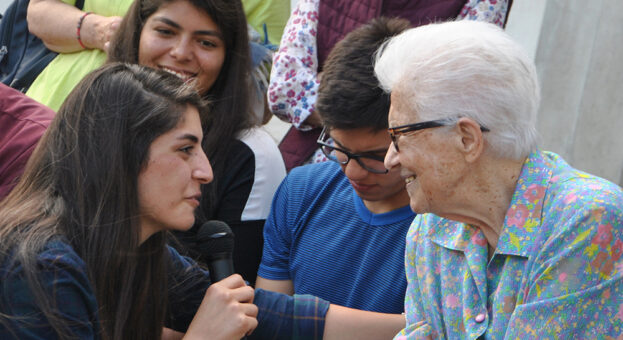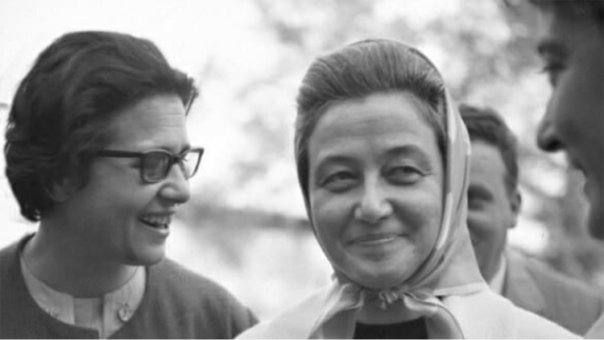11 Jan 2022 | Non categorizzato
Condolences and words of appreciation from Margaret Karram and the Focolare Movement on the death of the President of the European Parliament. “‘We need to open the European Parliament building to the homeless at night because it is painful to see so many people seeking shelter from the intense cold in the corners of our building here in Brussels. The poor cannot wait’. President Sassoli’s words in the year 2019 give me a sense of his human and civic stature and his vision for Europe. While today we are moved by this great loss, with deep gratitude we want to take up these values that we feel are ours too, and commit ourselves ever more to making them a reality”. This is how Margaret Karram, president of the Focolare Movement, expressed herself this morning on hearing of the death of the President of the European Parliament. She added: “His life, of such great human and political depth, stands before us now as a sign and authoritative testimony to a person who lived politics as service and worked towards a vision of Europe as a continent of fraternal peoples”. David Sassoli and young people In May 2021, President Sassoli spoke to the Youth for a United World of the Focolare Movement. They had invited him to speak on the subject of #daretocare, an international project, considering him as a witness to the kind of politics that is responsible for taking care of the world, starting with its wounds: “This image of ‘taking care’ is very beautiful, – he said – because politics has this goal, it cannot have any other: taking care of people, of one’s own community, of one’s own cities. I believe that this expression truly represents your determination to bet on the future”. “I was one of the young Europeans who had the privilege of talking to President Sassoli,” recalls Conleth Burns, an Irish researcher and organiser of the Dare to Care event. Two things struck us in what he said: his conviction that a politics deeply rooted in caring for people and communities is a better kind of politics and one that can transform society. And then his drive to bring politics and the institutions themselves closer to citizens, to strengthen our European democracy. President Sassoli’s vision and his testimony at the service of the common good, as a journalist and a politician, will continue to inspire us all”. Clara Verhegge, a young woman from Belgium, who spoke with the President, also says: “His commitment to the European reception of migrants – despite the fact that he felt powerless – touched my heart and that of many other young people. When we spoke with him, I realised that I was not alone. Indeed, I hope with more confidence that one day Europe will find a unified voice also when it comes to refugees’. When asked by Mátyás Németh, a young Hungarian, whether the climate issue could be an opportunity for the peoples of Europe to unite, President Sassoli said that Covid had made Europe realise that this was an opportunity to restart a common policy on which to base Europe’s post-pandemic recovery. He added: “I think that in times of difficulty we will need open societies that work together and we must be proud of the young people who remind the world of politics of the state of our planet”.
Stefania Tanesini

11 Jan 2022 | Non categorizzato
Palmira Frizzera, one of the first companions of Chiara Lubich, who died on 5th January 2022, will live on in the memory and in the lives of many: focolarini, young people and families, whom she accompanied in their formation at the Mariapolis Foco (Montet, Switzerland), the little town of the Focolare in which she lived for over 40 years. Drawing on her words, here are some moments that marked her path in life. “Nothing more can be done for your eyes”. This was the harsh diagnosis that the doctor gave to Palmira Frizzera a few months after she arrived in the first focolare in Piazza Cappuccini in Trent. Palmira was 18 when, three years earlier, in 1945, she met the first group of focolarine. She had had problems with her eyes for some time. Because of this her dream of going to be a missionary nun in India had also collapsed. But now the problem was getting more serious. After various visits to specialists that day, she went to an ophthalmologist in Trent, accompanied by Natalia Dallapiccola, another of Chiara Lubich’s first companions. Telling the story to a group of young people in 2004, Palmira said, “The doctor examined me thoroughly and then said: the right eye is lost already and the left eye is about to go”.

Palmira with Chiara Lubich © CSC Audiovisivi

© CSC Audiovisivi
Carlos Mana


